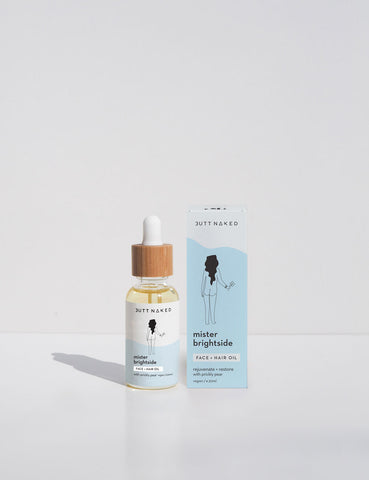expert-backed tips for healthy winter skin.
Baby, it’s cold outside, and you know what that means: cold weather makes your skin freak the f out.

Combine the cold with some indoor heating, hot showers and icy winds, and winter can wreak havoc on our precious skin. Colder temperatures can cause dehydrated, dry skin along with flaky, red and inflamed skin, especially if you have sensitive skin. But don't fret, it is possible to protect your complexion and maintain happy, plump and luminous skin throughout the winter months. We called on our expert resident Dermatologist Dr Kathleen Alpapara to guide us through the winter skin blues with tips and advice on the best skincare products and winter skin routine to keep your complexion looking at its mighty finest.
Tops tips to maintain healthy skin during the winter months
1. MOISTURISE
Keep in mind that no one moisturiser is suitable for all skin types, so choose the best one for you. Your moisturiser should include moisturising ingredients that are able to repair the skin barrier by sealing the gaps in between skin cells, sucking in moisture and trapping it there.
For dry skin, the colder months make it difficult to stay hydrated. Dr Alpapara suggests using thick creams and lotions and make sure you reapply every time your skin starts to dry again. You can also use thicker oils with a high comedogenic rating, for example, coconut oil. The thicker the moisturiser, the better - so look for skin care ingredients such as avocado, jojoba oil, and olive oil.
To keep hydrated if you have oily skin, use lightweight and non-comedogenic moisturisers and apply them to the areas with the most sebaceous glands. Adding skin care products, with low comedogenic ratings into your winter skincare routine can help balance your complexion all winter long. Dr Alpapara recommends natural oils like safflower, hemp seed, argan and grapeseed oils. Heavy creams or lotions can still be used on areas with fewer sebaceous glands on the body like the arms and legs.
2. AVOID IRRITATING SKINCARE PRODUCTS
The last thing you want to do is further irritate dry winter skin, especially if you experience skin sensitivity. Dr Alpapara recommended reducing the use of products with salicylic acid, AHA, and retinol, from twice a day or daily to just 3 times a week. For those that are acne-prone, all you need is to spot-treat those zits.
It is super important to be in tune with your skin, so if you start to sting from using these products or any other active ingredients, stop using them immediately. Never wait for your skin to become irritated or red, itchy and scaly!
3. CLEANSE PROPERLY
Use a mild cleanser and wash it off with lukewarm water gently. Avoid vigorous scrubbing and hot water. You can double cleanse with an oil first to remove make-up and dirt, then wash it off with a mild cleanser. That way, you wouldn’t need to scrub too hard. Short baths followed by a body oil are also recommended.
Cleanse Dust Enzyme Powdered Cleanser View

Adios Irritation Body & Face Oil View
4.CONTINUE USING SUNSCREEN
UV damage is not only contained to the summer months, despite the gloomy weather those UV rays are still lurking around. Dense clouds can only block up to 50% of UV rays, so you still need to wear your sunscreens. A good rule is to reapply them every 2 hours outdoors, this will prevent photoaging and skin cancer.
5.QUIT SMOKING
You may think smoking is like a blanket that increases your cold tolerance, but it causes you more harm than good. Smoking harms your health, increasing your risk of heart attack, stroke, cancer, etc. It also ages your skin prematurely. So, quit it!
6. USE A HUMIDIFIER
Another sure way to keep skin hydrated is to use a humidifier and keep the humidity above 30%. That way, the skin can readily suck in humidity while your moisturiser traps it.
7. EXECRCISE
A recent study showed that the skin hydration of people that are more active is higher than those that aren't as active. The study also showed that exercising doesn’t just improve dry skin, but can also help if you have a skin condition by providing relief.
8. EAT HEALTHY
Yep, we know, it is the oldest cliché in the book, but it's pretty spot on. Studies have proven the roles of nutrition in skin ageing and certain food like sweets or carbohydrates with high glycemic index can speed up ageing. A recent study showed the impact of diet on skin barrier hydration, showing that oils rich in fatty acids, like Flaxseed and hempseed oil, improve skin hydration and decrease water loss. Flaxseed oil, in particular, decreased scaling and roughness after 12 weeks of daily consumption.
9. AVOID SUPER HOT SHOWERS
Just like indoor heat, hot water can dry out your skin causing cracking and flaking. This is because your skin loses oils as the hot water strips them from your skin. So try to lower the heat in the bathroom to preserve whatever bit of moisture you can.
10. DON'T FORGET YOUR LIPS
Lips are prone to becoming extremely dry in winter due to the cold icy air and wind. This is because the skin on your lips is thinner and constantly exposed to environmental elements, plus, your lips do not have oil glands to keep them moisturised. Use a balm full of those essential fats to help maintain moisturise in your lips.

11. DRINK LOTS OF WATER
We can forget to drink water in the colder weather, so it's extremely important to stay hydrated in winter because our skin can't retain moisture as well, so maintaining your water intake helps replenish hydration.
Follow these easy-to-follow tips to keep your skin healthy in winter and all seasons.
Kathleen Alpapara is a board-certified dermatologist who practices both medical and cosmetic dermatology at VE Eusebio Skin Centre.
article sources
don’t miss / most popular






